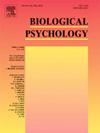Individuals with depressive disorders have deficits in inhibitory control and exhibit symptoms of impaired cognitive and emotional functioning. Individuals with subsyndromal depression are intermediate between the healthy group and clinically diagnosed patients with depressive disorders, and studying the characteristics of their inhibitory control functioning can help to investigate the mechanisms underlying the development of depressive disorders. Using two classical paradigms of inhibitory control, Flanker and Go/NoGo, the present study explored the differences in inhibitory control between individuals with subsyndromal depression and healthy individuals from the perspectives of both response inhibition and interference control. Behavioral results showed that both groups did not differ in response time and accuracy; in terms of event-related potentials, individuals with subsyndromal depression presented smaller N2 amplitudes as well as larger P3 amplitudes in the NoGo condition of the Go/NoGo paradigm; and smaller N2 amplitudes in the incongruent condition of the Flanker paradigm. Moreover, the depression-prone group showed lower theta power compared to the healthy group in the NoGo condition of the NoGo paradigm and the incongruent condition of the Flanker paradigm. The present study reveals that the depression-prone group may have a compensatory mechanism in the response inhibition, which is mainly manifested as early under-activation as well as late over-activation.


